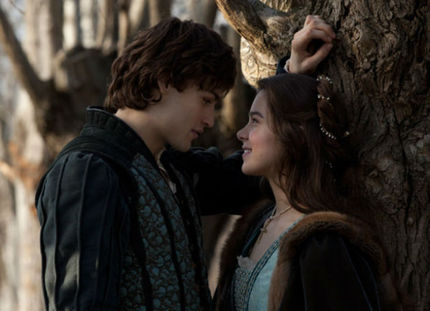Review: ROMEO & JULIET, I Pray Thee Know This Movie Loves Close-Ups

If every generation gets the Romeo & Juliet it deserves, then this generation is doomed to relive the past in a reverential and utterly unremarkable series of close-ups.
Adapted without distinction by Julian Fellowes and directed without distraction by Carlo Carlei, the 2013 movie edition of William Shakespeare's tragedy features Hailee Steinfeld (15 years old at the time of filming) and Douglas Booth (19 or 20) as the young lovers, and even there the casting is mismatched. Perhaps if Kodi Smit-McPhee (15) had starred as Romeo opposite Steinfeld's Juliet, the story of two teenagers caught up in smoldering adolescent passion would have played better, and possibly would have elicited greater empathy for the characters.
As it is, however, Smit-McPhee is relegated to playing Benvolio, Romeo's would be peacemaker of a cousin, and Booth and Steinfeld must endeavor to spark a relationship with chaste kisses and the utmost respect for one another's personal boundaries. Frankly, it plays out like a college boy courting a 15-year-old girl, which makes it, more than anything else, awkward and uncomfortable. Neither of them is a disaster, but then neither is called upon to do much more than recite their lines with breathless abandon and stare into one another's eyes at just the right angle to allow key lights to bounce off their irises.
That's important, because this version of Romeo & Juliet loves close-ups, and also loves the constant musical accompaniment of the original score by Abel Korzeniowski, which signals the intent of every scene early and often while taking precedence over the dialogue in the sound mix. David Tattersall, who served as director of photography, does perfectly fine work, and the crews that worked on production design, art direction, costuming, and makeup provide beautiful, detailed backdrops.
Among the large cast, Lesley Manville (the Nurse), Damian Lewis (Lord Capulet), and Paul Giamatti (Friar Laurence) stand out because their personalities soak through the stiff surroundings, bringing the film to life whenever they're on screen. As a whole, the cast tries hard, but they are fighting against implacable foes: the script and the direction.
For all that he has been justly celebrated for his creation and scripting of Downton Abbey, Julian Fellowes never makes apparent why his new version of Shakespeare is relevant or even necessary. His choices are not revelatory in the least and the dialogue he invents is little more than an imitation of the real thing without any added vim or vigor. Likewise, Carlo Carlei's direction is lackluster, his framing and staging is perfunctory, and the performances rarely rev up emotional engines with any conviction. Any comparison to Baz Luhrmann's revisionist 1996 version is pointless, because this version is content to reheat leftovers without freshening up the ingredients.
On the positive (?) side, every tear that is shed is lit, shot, and showcased so as not to miss a glistening drop. It's almost enough to make one cry for this generation of moviegoers.
Romeo & Juliet opens wide in theaters across North America and the United Kingdom on Friday, October 11.







